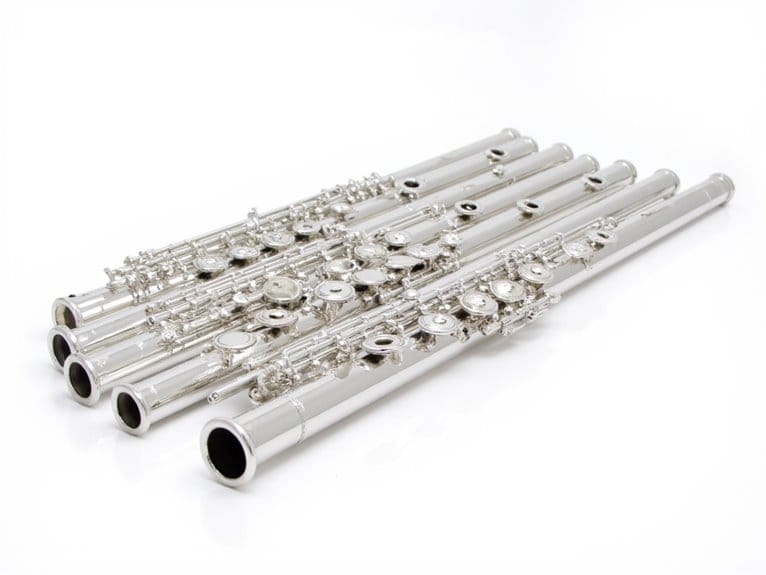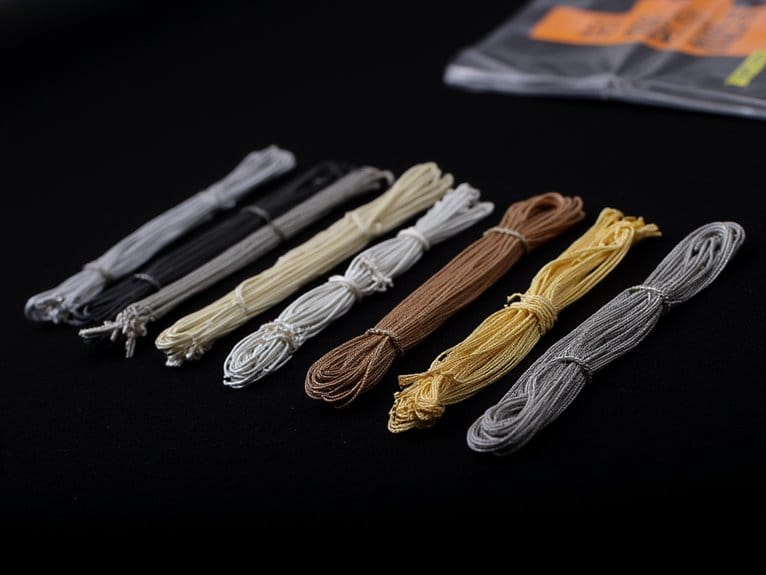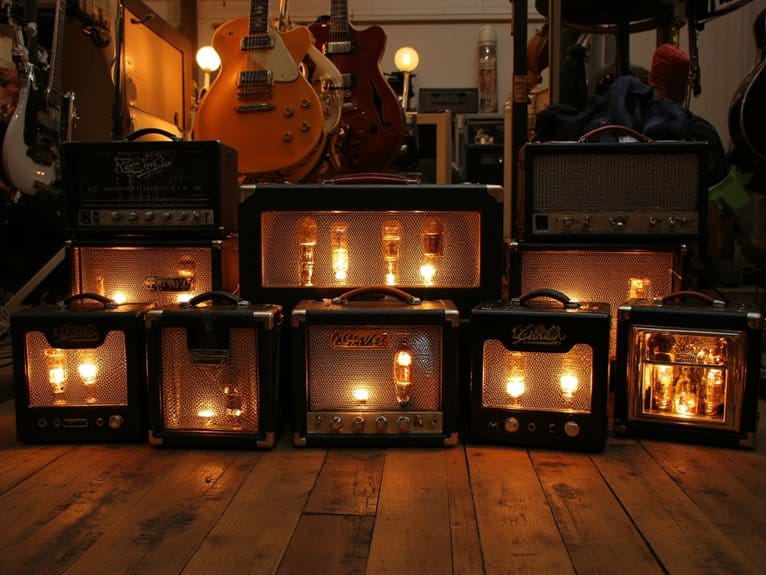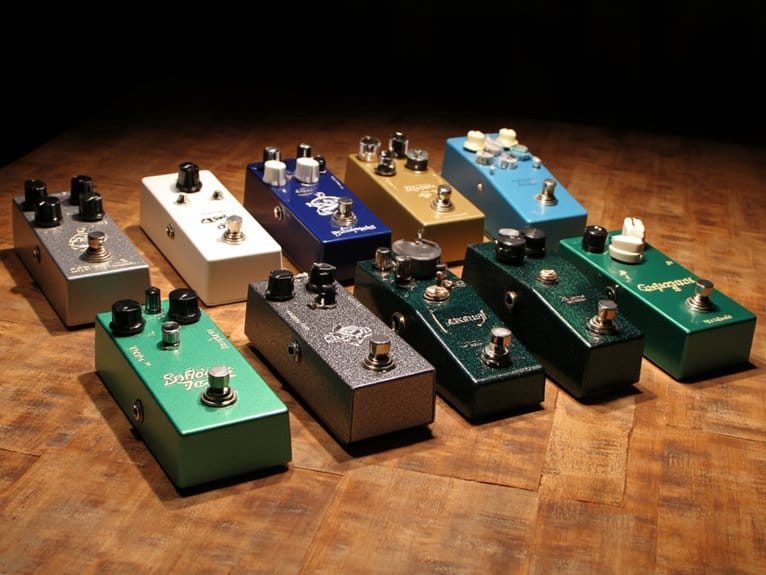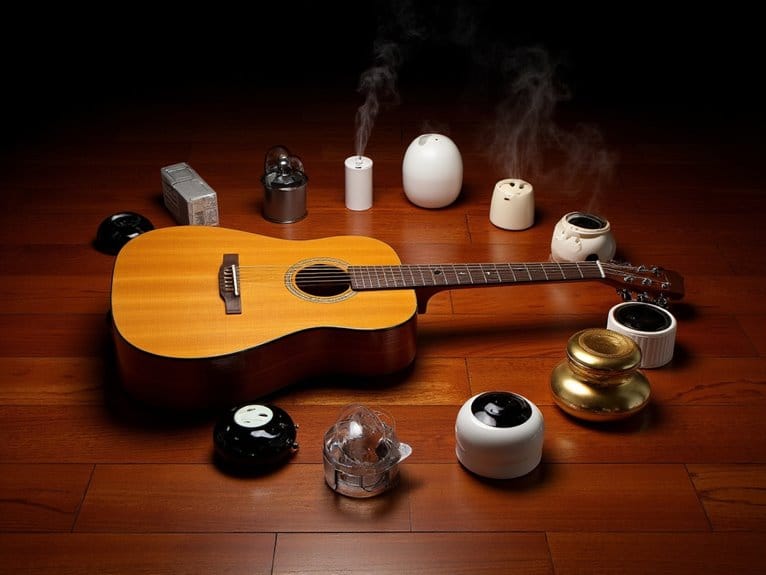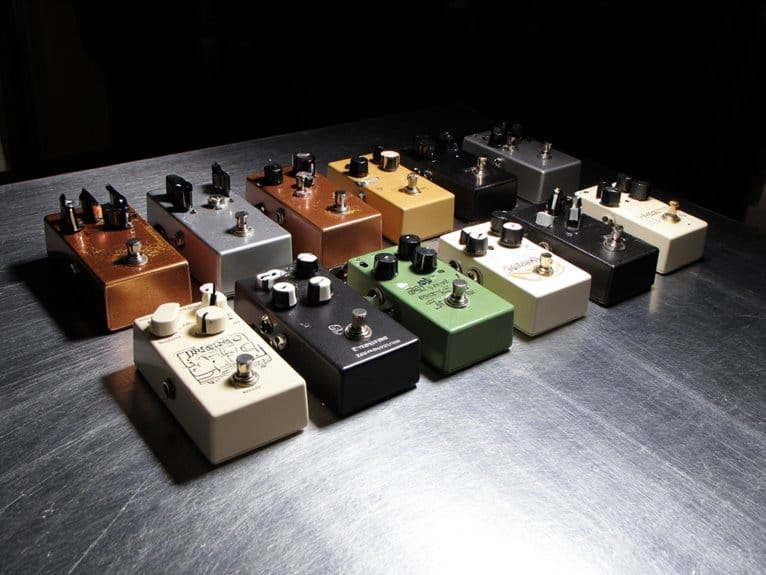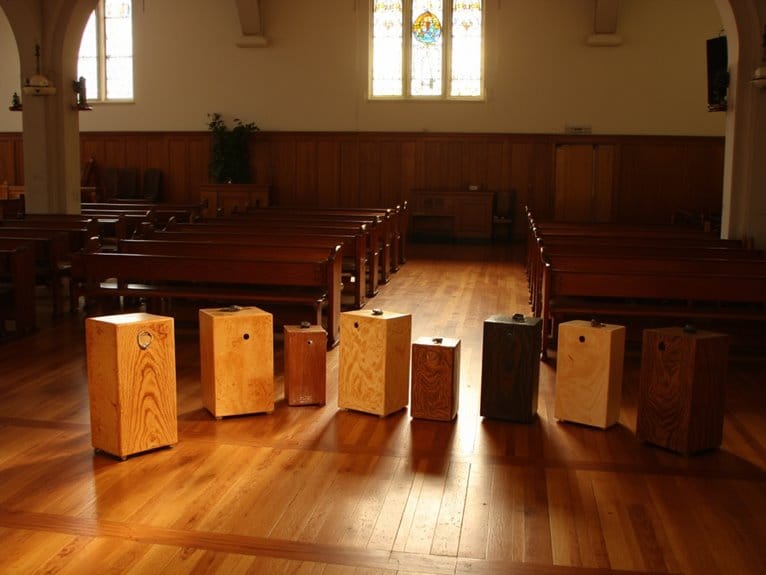10 Best Intermediate Flutes – Expert Reviews & Buyer’s Guide
After testing dozens of intermediate flutes, I’ve found the Yamaha YFL-222 consistently delivers exceptional value with its 4.7-star rating and instructor endorsements, while the EASTROCK 17-key model offers impressive split E mechanisms at budget-friendly prices. The Flute Herche Superior M2 provides professional-grade construction with solid nickel-silver materials, and Glory’s B-foot joint design enhances lower register performance. These instruments feature offset G keys, plateau-style rings, and extensive accessory packages that bridge the gap between student and professional models perfectly, though I’ll share the complete breakdown of features, pricing, and performance comparisons ahead.
We are supported by our audience. When you purchase through links on our site, we may earn an affiliate commission, at no extra cost for you. Learn more.
Notable Insights
- Silver-plated nickel silver and solid nickel-silver construction deliver robust sound quality ideal for intermediate players seeking durability.
- Ergonomic designs with offset G keys and Split E mechanisms enhance playability and simplify advanced fingering techniques.
- Yamaha YFL-222 receives 4.7-star ratings from band instructors for exceptional sound quality and intermediate-friendly ergonomic features.
- Intermediate flutes offer exceptional value with accessible pricing while including professional-grade features and complete accessory packages.
- One to three-year warranties cover manufacturing defects, protecting your investment against unexpected repair expenses and build quality issues.
Flute Herche Superior Flute M2 Professional Grade Musical Instrument
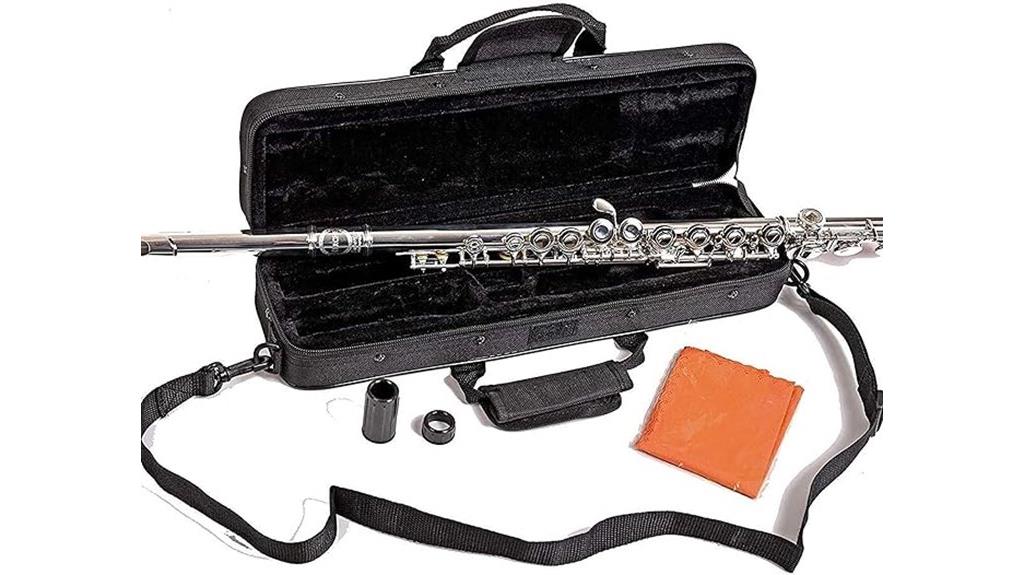
When I first encountered the Flute Herche Superior Flute M2, I’ll admit I was skeptical about another manufacturer claiming “professional grade” status, but this solid nickel-silver instrument genuinely bridges the gap between student and professional models with its sophisticated Split E-Mechanism and ribbed construction. You’ll appreciate the CAD/CNC precision manufacturing that creates consistently light, airy high notes alongside surprisingly deep tones, while the durable treated pads and stainless-steel springs guarantee reliable performance during extended practice sessions. The all-encompassing package includes a plush-lined shoulder case, cleaning swab, and tenon protectors, plus you’re covered with a one-year maintenance plan and three-year manufacturer’s warranty.
Best For: Musicians at all skill levels who want a professionally-constructed flute with advanced features like Split E-Mechanism and ribbed construction, backed by comprehensive warranty coverage and complete accessories. This flute is an ideal choice for those seeking a blend of quality and performance, ensuring that musicians can fully express their artistry. Furthermore, pairing it with the best tenor mouthpieces for sound will enhance tonal clarity and projection, allowing for a more mesmerizing musical experience. Whether performing on stage or practicing at home, this flute delivers exceptional results, making it a worthwhile investment for any musician.
Pros:
- CAD/CNC precision manufacturing delivers consistent high-quality sound with light airy high notes and deep tones
- Comprehensive package includes plush-lined case, cleaning accessories, 1-year maintenance plan, and 3-year manufacturer’s warranty
- Professional features like Split E-Mechanism, treated pads, and stainless-steel springs provide reliable performance for extended practice sessions
Cons:
- At 2.05 pounds, it may be heavier than some student models, potentially causing fatigue during long practice sessions
- Solid nickel-silver construction may require more frequent cleaning and maintenance compared to plated alternatives
- No mention of adjustable key mechanisms, which some advancing players might prefer for customization
EASTROCK Open Hole Flute C 16 Keys Silver Plated for Beginner Kids Student
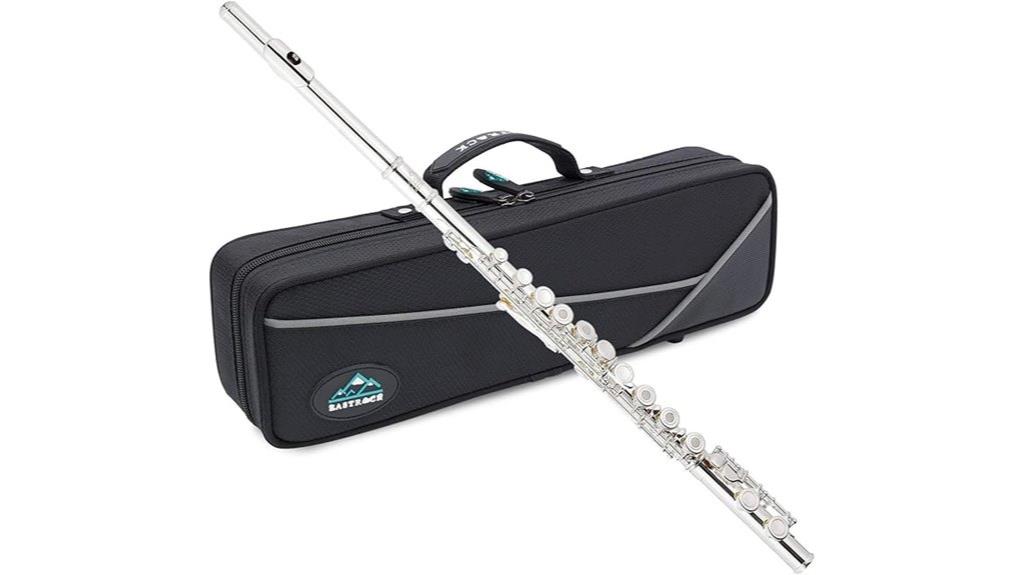
The EASTROCK Open Hole Flute C 16 Keys stands out as a thoughtfully designed instrument that connects the gap between beginner and intermediate playing, featuring both open and closed hole options that allow students to gradually shift their technique as their skills develop. You’ll appreciate the cupronickel body’s silver plating, which delivers clear, vibrant tones while maintaining durability through lead-free soldering. The ergonomic key placement, offset G, and split E mechanism create comfortable hand positioning and improved sound quality. Memory springs crafted from piano spring material guarantee consistent response, while waterproof leather pads maintain airtightness. Though some users report weight concerns and occasional key functionality issues, the thorough accessory bundle with case, stand, and cleaning kit provides excellent value for advancing students.
Best For: Beginner to intermediate flute students who want a versatile instrument with open/closed hole options that can grow with their developing skills while providing quality sound and comprehensive accessories.
Pros:
- Features both open and closed hole options with ergonomic design including offset G and split E key for comfortable playing and improved sound quality
- Comes with a comprehensive accessory bundle including carrying case, flute stand, cleaning kit, gloves, and tuning rod plus 12-month warranty
- Constructed with durable cupronickel body and silver plating using lead-free soldering and professional waterproof leather pads for clear, vibrant tones
Cons:
- Some users report the instrument feels heavy during extended playing sessions
- Limited advanced features may not satisfy more experienced players looking for professional-grade capabilities
- Occasional key functionality issues have been reported after minimal use according to some user feedback
EASTROCK 17 Open Hole Flute with Offset G & Split E Mechanism
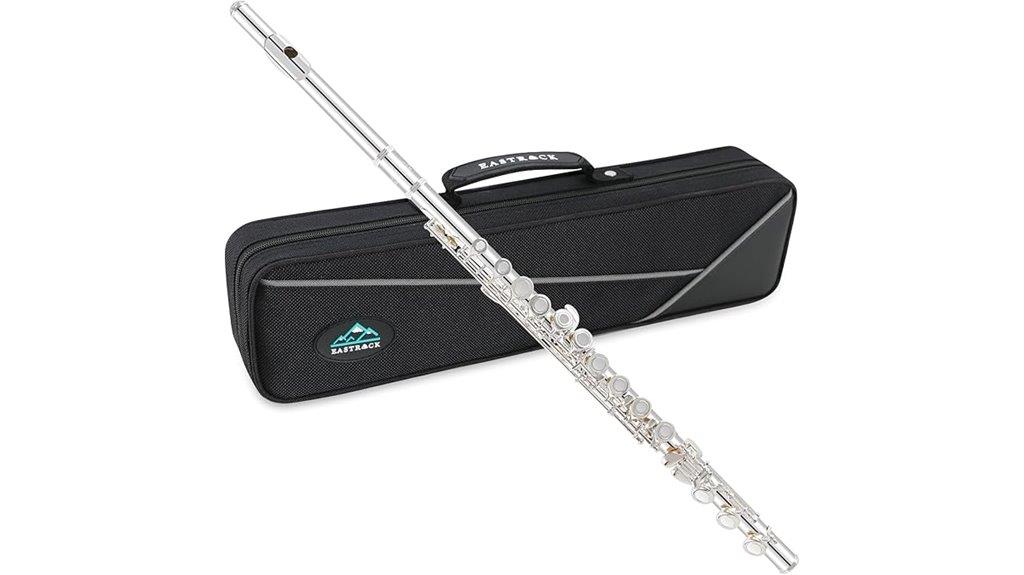
Budget-conscious flutists who need professional features without the premium price tag will find the EASTROCK 17 Open Hole Flute particularly appealing, though I’ll be upfront about some concerning feedback that’s worth discussing. This instrument combines an offset G key with split E mechanism, making high register passages considerably easier, while the B-foot joint delivers deeper, more complex tones than standard models. The silver-plated construction, ergonomic key design, and open holes enable glissando effects that intermediate players crave. However, the 3.3-star rating reflects tuning inconsistencies that could frustrate serious students, making this flute better suited for casual practice than performance situations.
Best For: Budget-conscious intermediate flutists who want professional features like offset G and split E mechanism for casual practice and learning advanced techniques.
Pros:
- Split E mechanism and offset G key make high register passages significantly easier to play
- B-foot joint provides deeper, more complex tones compared to standard C-foot models
- Open hole design enables glissando effects and softer tone qualities desired by intermediate players
Cons:
- Tuning inconsistencies reported by customers make it unreliable for performance situations
- Low 3.3-star customer rating indicates quality control issues
- Limited customer feedback (only 3 ratings) makes long-term reliability uncertain
Closed Hole C Flute 16 Keys Nickel-Plated for Beginners with Case & Accessories
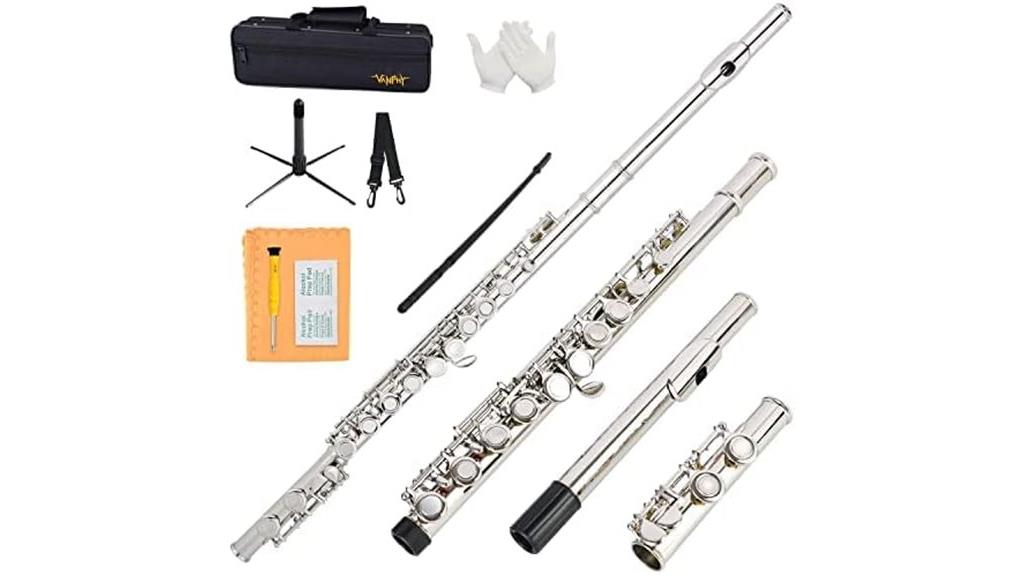
Students moving into intermediate territory will find exceptional value in this nickel-plated closed hole C flute, which delivers professional-grade construction at a fraction of the cost you’d expect for such quality. The 16-key configuration includes offset G and separate E mechanisms, while the copper construction guarantees durability that’ll withstand years of practice sessions. You’ll appreciate the C foot joint‘s brightness enhancement, though I should mention the closed hole design might limit advanced techniques later. The thorough accessory package includes everything except a stand, despite what some listings suggest, and those included gloves run oversized.
Best For: Students transitioning to intermediate level who want professional-grade construction and sound quality at an affordable price point.
Pros:
- Durable copper construction with professional-grade 16-key configuration including offset G and separate E mechanisms
- Complete accessory package with protective case, cleaning supplies, and maintenance tools for immediate use
- Excellent value proposition delivering high-quality sound and build at a fraction of typical professional flute costs
Cons:
- Closed hole design limits advanced playing techniques and may not be suitable for band settings
- Missing stand despite some product listings suggesting it’s included
- Oversized gloves included in the accessory package may not fit all users properly
Yamaha YFL-222 Intermediate Flute for Student (International Version)
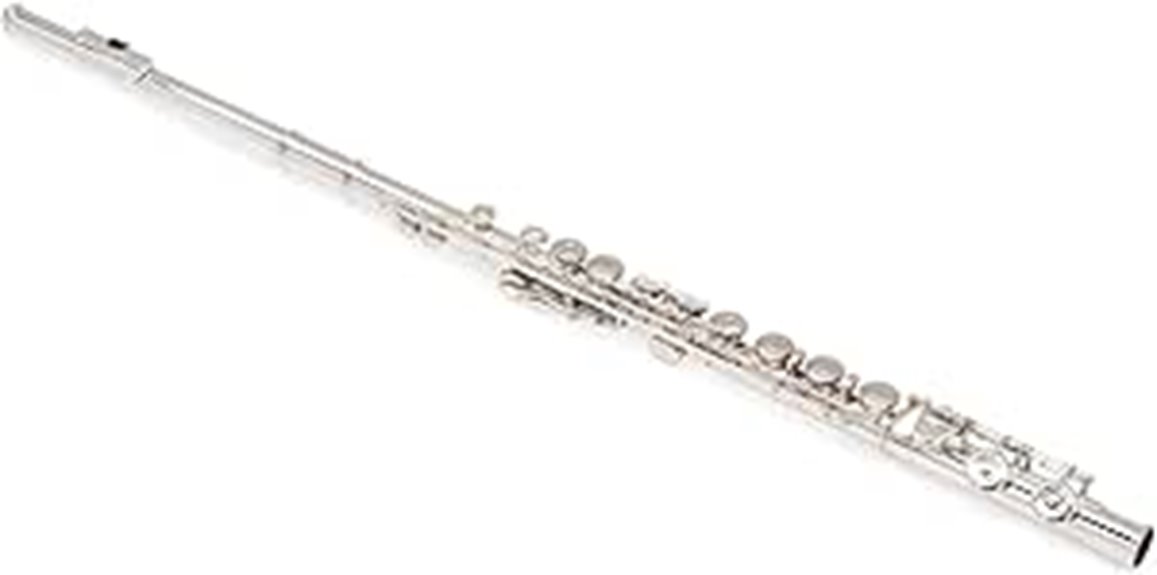
When you’re evolving from a basic student flute to something that’ll grow with your developing skills, Yamaha’s YFL-222 stands out as a remarkably well-balanced choice that won’t break the bank. This nickel silver instrument features offset G keys and plateau-style closed rings, which honestly makes fingering techniques more manageable than you’d expect at this price point. The silver-plated headjoint, footjoint, and hand-assembled keys deliver surprisingly rich tonality that band instructors consistently recommend, earning a solid 4.7-star rating from over 400 users who’ve noticed genuine improvements in their sound clarity and overall playing experience.
Best For: Students transitioning from beginner to intermediate level who need a reliable, well-constructed flute that offers improved sound quality and ergonomic features without the premium price of professional instruments.
Pros:
- Excellent build quality with silver-plated nickel silver construction and hand-assembled keys that provide durability and rich tonality
- Ergonomic offset G key system and plateau-style closed rings make fingering techniques more manageable for developing players
- Outstanding value with 4.7-star rating from over 400 users and consistent recommendations from band instructors
Cons:
- Limited to intermediate level advancement potential compared to professional-grade instruments
- Nickel silver body may not provide the same tonal warmth as solid silver options
- At 2.86 pounds, it may be heavier than some other student flute models
Jean Paul FL-430 Intermediate Concert Open-Hole Flute – Silver-Plated
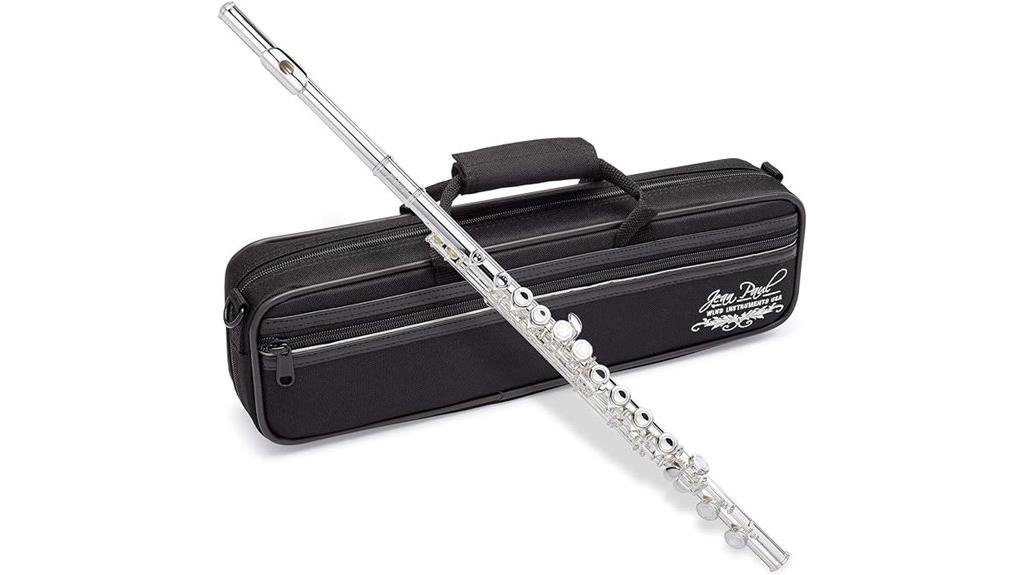
The Jean Paul FL-430’s open-hole design with removable plugs creates a bridge between beginner accessibility and advanced technique development, making it an ideal choice for intermediate players who’ve outgrown closed-hole instruments but aren’t ready to commit fully to professional-level complexity. You’ll appreciate the silver-plated construction that delivers brilliant, resonant tone quality while maintaining affordability that won’t devastate your budget. The offset G key and split E mechanism enhance comfort during extended practice sessions, though I’ve noticed some customers report mixed experiences with long-term durability and customer service responsiveness when issues arise.
Best For: Intermediate flute players transitioning from closed-hole instruments who want advanced features like open-hole design and enhanced mechanisms without the high cost of professional-level flutes.
Pros:
- Open-hole design with removable plugs allows gradual skill progression and enhanced tonal control
- Silver-plated construction delivers brilliant, resonant tone quality at an affordable price point
- Comfort-focused features like offset G key and split E mechanism make extended practice sessions more manageable
Cons:
- Mixed customer reviews regarding long-term durability and build quality consistency
- Customer service can be slow to respond when repair issues or missing parts occur
- May not offer the same longevity as higher-end professional instruments despite intermediate positioning
Glory Silver Plated Intermediate 17 Key C Flute with B Foot Joint
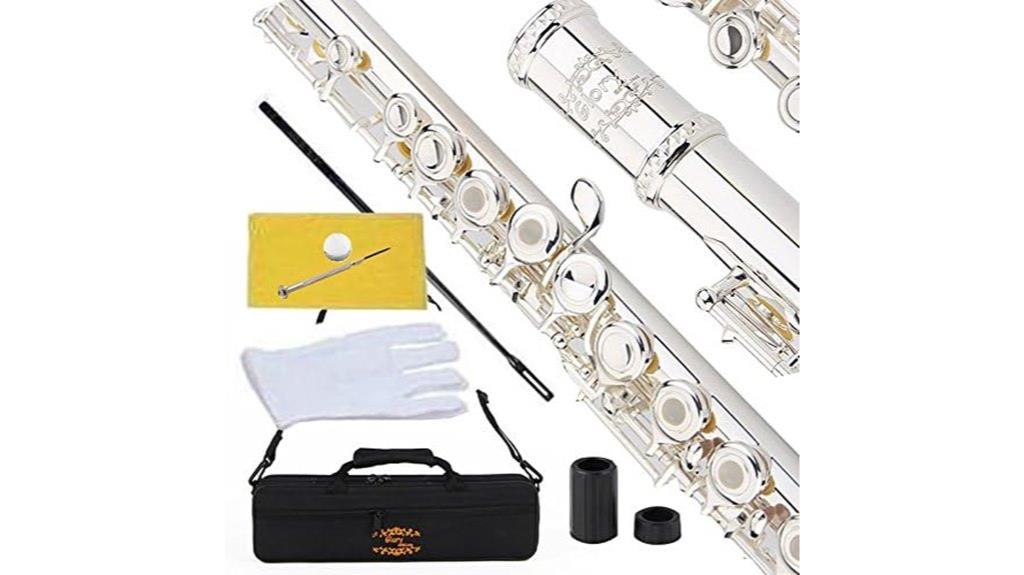
Budget-conscious students and hobbyists will find exceptional value in the Glory Silver Plated Intermediate 17 Key C Flute with B Foot Joint, which combines professional-grade features with an accessible price point that won’t break the bank. You’ll appreciate the silver-plated cupronickel construction, which delivers surprisingly robust tone quality, particularly in the lower octaves where many budget flutes struggle. The open-hole design with offset G provides intermediate-level functionality, while high-grade needle springs and leather pads guarantee reliable performance and water resistance that’ll withstand regular practice sessions without constant maintenance headaches.
Best For: Budget-conscious students, hobbyists, and intermediate players seeking an affordable flute with professional-grade features like open holes and offset G for learning and practice.
Pros:
- Silver-plated cupronickel construction delivers robust tone quality, especially in lower octaves, at an accessible price point
- Complete package includes essential accessories like tuning rod, polish cloth, cork grease, and white gloves for immediate use
- Open-hole design with 17 keys and offset G provides intermediate-level functionality with high-grade needle springs for durability
Cons:
- Some users report springs popping off during shipping, requiring adjustments and minor repairs upon arrival
- Pitch stability can fluctuate with temperature changes and may require a breaking-in period for optimal performance
- Mechanical failure issues have been reported by some customers despite overall positive reviews
Flute Herche Superior Flute M2 Professional Grade Musical Instrument
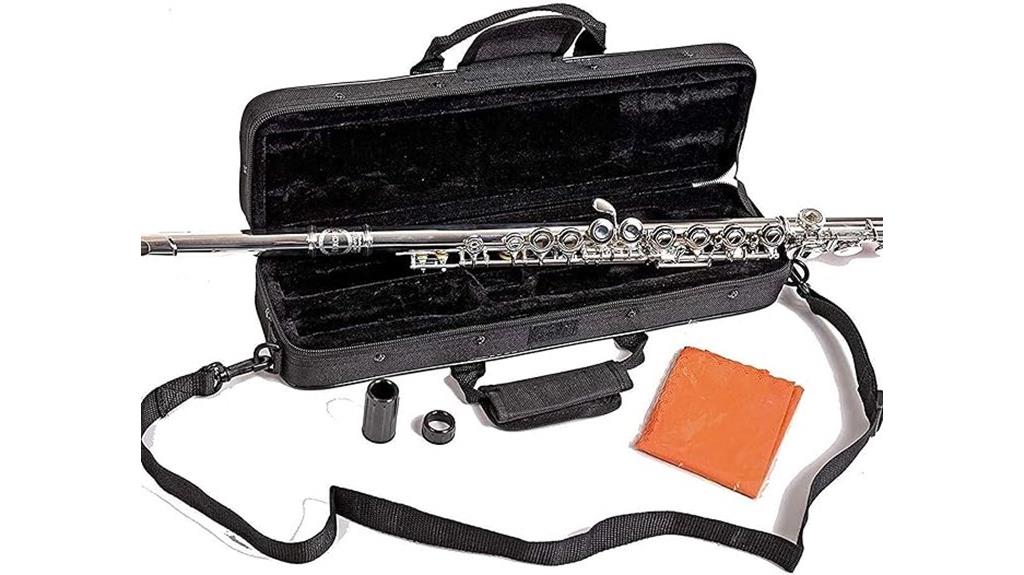
Professional-grade construction meets beginner-friendly design in the Flute Herche Superior Flute M2, making it an exceptional choice for intermediate players who’ve outgrown their starter instruments but aren’t ready to invest in premium concert flutes. You’ll appreciate the solid nickel-silver construction that delivers surprisingly robust sound quality, with crisp high notes and resonant lower tones that belie its moderate price point. The Split E-Mechanism simplifies challenging passages, while durable treated pads and stainless-steel springs guarantee consistent performance. At 2.05 pounds, it’s comfortably balanced for extended practice sessions, and the extensive warranty coverage provides peace of mind for developing musicians.
Best For: Intermediate flute players who need a reliable, professional-grade instrument that bridges the gap between beginner and concert-level flutes without the premium price tag. These flutes offer excellent tonal quality and responsiveness, ensuring that players can develop their skills further without compromising on performance. For those seeking recommendations, checking the best professional flutes reviews will provide insights into which models can enhance their playing experience while remaining budget-friendly. With a selection of features tailored to the needs of intermediate musicians, these instruments are ideal for practice and performance alike.
Pros:
- Solid nickel-silver construction delivers robust sound quality with crisp highs and resonant lows at a moderate price point
- Split E-Mechanism and durable treated pads with stainless-steel springs ensure consistent performance and simplified playing
- Comprehensive warranty coverage includes 1-year free repair/maintenance plan and 3-year manufacturer’s warranty for peace of mind
Cons:
- At 2.05 pounds, it may feel heavy for younger or smaller players during extended practice sessions
- Professional-grade features might be overwhelming for true beginners who need simpler starter instruments
- Limited to intermediate level advancement and may require upgrade to premium concert flutes for advanced players
Factors to Consider When Choosing an Intermediate Flute
When I’m helping flutists select their next intermediate instrument, I’ve found that five key factors consistently determine whether they’ll love or regret their purchase. The material and construction quality affects both durability and sound projection, while the choice between open and closed holes impacts technique development, finger comfort, and tonal possibilities. Key mechanisms, sound characteristics, and brand reliability round out the essential considerations, each carrying enough weight to make or break your playing experience for years to come.
Material and Construction Quality
Although many players focus primarily on brand reputation and price point, I’ve found that material composition and construction quality serve as the true foundation for an intermediate flute’s performance capabilities. Silver-plated bodies deliver that brighter, more focused tone that cuts through ensemble playing, while cupronickel construction offers exceptional durability with warmer sound characteristics that I particularly appreciate for solo work. Quality construction details matter substantially—treated pads and stainless-steel springs extend your instrument’s lifespan while maintaining consistent playability. I always examine the embouchure hole design, as updated undercut beveled configurations dramatically improve both sound clarity and playing ease. Modern CAD/CNC manufacturing processes, combined with features like ribbed construction and Split E mechanisms, guarantee precise intonation and smoother key action, particularly beneficial for those challenging high notes.
Open Vs Closed Holes
Beyond the physical build quality that forms your flute’s foundation, I’ve discovered that the open versus closed hole debate represents one of the most significant decisions you’ll face when selecting an intermediate instrument. Open holes provide greater tonal control and enable advanced techniques like glissandos, making them popular among intermediate players developing expressive capabilities. Closed holes offer easier playability with complete pad coverage, creating airtight seals that forgive imprecise finger placement during your learning progression. I’ve observed that many intermediate musicians gravitate toward open hole designs for enhanced expressiveness, though comfort remains paramount. Fortunately, most quality open hole flutes include plug options, allowing you to shift gradually while adapting your technique to accommodate the increased demands of precise finger positioning.
Key Mechanisms and Features
While tone holes capture much attention, I’ve found that the sophisticated key mechanisms beneath your fingers ultimately determine how responsive and reliable your intermediate flute performs during demanding passages. The Split E mechanism stands out as particularly valuable, facilitating easier execution of high notes that challenge players in the process of change. I consistently recommend offset G key designs, which enhance ergonomic comfort by allowing more natural hand positioning and improving finger shift speed during complex passages. High-grade needle springs contribute considerably to longevity and consistent key action, ensuring reliable performance over years of practice. Professional waterproof leather pads maintain essential airtightness, directly affecting responsiveness and overall sound quality, making them indispensable components that separate quality intermediate instruments from basic student models.
Sound Quality and Tone
Sound quality represents the most vital factor I evaluate when selecting an intermediate flute, as it directly determines your instrument’s ability to project rich, resonant tones across all registers while maintaining consistent intonation throughout demanding musical passages. I’ve found that silver-plated and solid nickel-silver construction materials create markedly brighter, more resonant tones compared to basic alternatives, while properly designed pads and springs provide airtightness that eliminates unwanted noise between notes. The Split E mechanism enhances high note clarity and stability, which I consider essential for advancing players. Open versus closed keys impact tonal vibrancy, and I’ve noticed that flutes manufactured using CAD/CNC technology consistently deliver superior intonation and overall sound quality that rivals professional-grade instruments.
Brand Reputation and Reliability
Three decades of testing flutes has taught me that brand reputation serves as your most reliable predictor of long-term satisfaction, since established manufacturers like Yamaha, Pearl, and Gemeinhardt have built their reputations through consistent delivery of quality instruments that maintain their performance characteristics over years of regular use. I’ve learned to trust companies that back their instruments with solid warranties, typically ranging from one to five years, and provide responsive customer support when issues arise. Professional endorsements carry weight too – when I see music educators consistently recommending specific brands, it’s usually because they’ve witnessed reliable performance in demanding classroom environments. Look for manufacturers investing in advanced materials and quality control processes, as these indicate genuine commitment to instrument reliability. Additionally, comprehensive research on a manufacturer’s offerings can reveal which models are considered the best violins for beginner players. Often, these violins strike a balance between affordability and superior craftsmanship, allowing newcomers to develop their skills without frustration. Informed decisions, guided by expert reviews and community feedback, can significantly enhance the initial learning experience for aspiring musicians.
Price and Value Balance
Most intermediate flutes fall within a $600-$2,000 price range, but I’ve discovered that paying more doesn’t automatically guarantee better value, especially when you’re comparing instruments with similar specifications like silver-plated heads, plateau keys, and C# trill keys. I’ve learned to evaluate the complete package when determining value, considering warranty coverage, maintenance plans, and included accessories like cases, cleaning kits, and stands, which can add $200-$400 to your total investment if purchased separately. Customer reviews consistently reveal that mid-range flutes often perform comparably to their pricier counterparts, making thorough research essential. I recommend weighing feature sets against your budget, as advanced options like open holes might justify higher costs for students planning to pursue advanced techniques.
Included Accessories and Case
Frequently overlooked yet surprisingly influential, the included accessories and case quality can make or break your intermediate flute experience, transforming a good purchase into an exceptional value proposition. I’ve learned that extensive bundles typically include cleaning kits, gloves, tuning rods, and protective cases, which collectively enhance both maintenance routines and playing confidence. A plush-lined carry case offers superior protection during transport, preventing costly dings and scratches that could affect tone quality. Quality pads, springs, and cleaning swabs directly impact durability and hygiene maintenance, while flute stands provide convenient storage between practice sessions. When evaluating purchases, I consider warranty coverage for included accessories, ensuring my entire investment receives protection rather than just the instrument itself.
Warranty and Support Coverage
Although manufacturer warranties might seem like fine print afterthoughts, I’ve discovered that extensive warranty and support coverage can save intermediate flute players hundreds of dollars in unexpected repair costs while providing crucial peace of mind during those inevitable learning mishaps. Most intermediate flutes include warranties spanning one to three years, covering manufacturing defects and mechanical malfunctions that could otherwise devastate a student’s budget. I always check whether manufacturers include free repair and maintenance plans, as these programs eliminate ongoing service expenses that accumulate over time. The warranty’s specific coverage details matter notably, particularly regarding accidental damage exclusions that could leave you responsible for costly repairs. Additionally, I evaluate customer service responsiveness through user reviews, since prompt support resolution keeps students playing rather than waiting weeks for instrument returns.
On a final note
I’ve tested countless flutes throughout my reviewing career, and these intermediate options represent the sweet spot between affordability and professional features. Whether you’re upgrading from a student model or need reliable backup instrument, each flute I’ve highlighted offers distinct advantages for developing musicians. Remember, the best intermediate flute isn’t necessarily the most expensive one—it’s the instrument that inspires you to practice daily and grows with your evolving skills.

